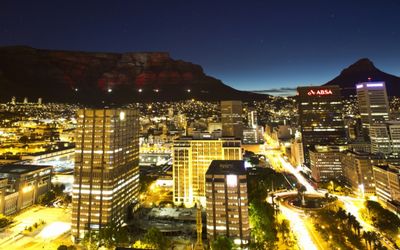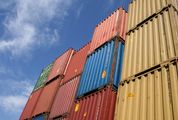CAPE Town wants to see all residents being able to generate their own renewable energy in future as part of efforts to reduce greenhouse gases.
Writing in her weekly newsletter on Thursday, Cape Town mayor Patricia de Lille said the city was considering ways to make it easier and cheaper for households and businesses to generate renewable energy on a wider scale.
"A potentially huge source of untapped energy is ... staring at us from the rooftops of Cape Town which can accommodate both solar water heaters and photovoltaic (PV) systems. Households and businesses which generate renewable energy through rooftop PV panels are now able to feed excess electricity back into the city’s grid, allowing us to diversify our energy supply.
"Our ultimate goal is to see all residents generate renewable energy," said Ms de Lille.
Scientists have linked greenhouse gases such as carbon dioxide, produced by burning fossil fuels, to rapid climate change.
Renewable energy is set to take centre stage at the United Nations Climate Change Conference, COP 21, in Paris, with countries being encouraged to invest in renewable energies such as hydro, geothermal, solar and wind.
Ms de Lille said Cape Town was determined to move ahead with procuring power from renewable energy independent power producers so that the city could reach its target of sourcing at least 10% of its energy from renewable sources by 2020.
"We have initiated discussions with the national Department of Energy as cities in SA currently have to obtain permission if they wish to procure power from any other entity besides the State electricity utility, Eskom. This kind of monopoly control of our national energy system needs to be reformed if South African cities are to play a more meaningful role in securing their own clean energy future," said Ms de Lille.
She said climate change was a global challenge that would require an unprecedented level of international co-operation to prevent the planet from warming more than 2°C above pre-industrial levels: global scientists have calculated this will be the point at which a dangerous destabilisation of the earth’s climate system will be felt.
Scientists estimate the effects could range from extreme weather events to an increase in vector-borne diseases and devastating consequences for biodiversity and the world’s food production systems, Ms de Lille said.
"It is therefore vitally important that an agreement is struck in Paris at COP21 that gives the world a sense of hope that this issue is finally being addressed and given the global political priority it deserves. The overall ambition for COP21 was in fact set at COP17 in Durban, where it was agreed that a global treaty would be agreed upon by 2015, with all countries of the world having to make ‘intended nationally determined commitments’ based on their specific conditions and abilities.
"Unfortunately, the emission reduction commitments which have so far been communicated will not be enough to keep us below the 2°C warming level and could in fact put the world on a 3°C warming trajectory. This is quite simply an outcome we cannot accept.
"The City of Cape Town believes that tackling climate change is too much of an important issue to be left solely in the domain of international negotiations. A global climate change agreement that sets legally enforceable emission reduction targets in line with what science requires would certainly be a good first step, but it is at the local level where real action can be driven on this issue and cities need to be empowered to do so," Ms de Lille wrote in her newsletter.

Cape Town at night. Picture: THE TIMES
CAPE Town wants to see all residents being able to generate their own renewable energy in future as part of efforts to reduce greenhouse gases.
Writing in her weekly newsletter on Thursday, Cape Town mayor Patricia de Lille said the city was considering ways to make it easier and cheaper for households and businesses to generate renewable energy on a wider scale.
"A potentially huge source of untapped energy is ... staring at us from the rooftops of Cape Town which can accommodate both solar water heaters and photovoltaic (PV) systems. Households and businesses which generate renewable energy through rooftop PV panels are now able to feed excess electricity back into the city’s grid, allowing us to diversify our energy supply.
"Our ultimate goal is to see all residents generate renewable energy," said Ms de Lille.
Scientists have linked greenhouse gases such as carbon dioxide, produced by burning fossil fuels, to rapid climate change.
Renewable energy is set to take centre stage at the United Nations Climate Change Conference, COP 21, in Paris, with countries being encouraged to invest in renewable energies such as hydro, geothermal, solar and wind.
Ms de Lille said Cape Town was determined to move ahead with procuring power from renewable energy independent power producers so that the city could reach its target of sourcing at least 10% of its energy from renewable sources by 2020.
"We have initiated discussions with the national Department of Energy as cities in SA currently have to obtain permission if they wish to procure power from any other entity besides the State electricity utility, Eskom. This kind of monopoly control of our national energy system needs to be reformed if South African cities are to play a more meaningful role in securing their own clean energy future," said Ms de Lille.
She said climate change was a global challenge that would require an unprecedented level of international co-operation to prevent the planet from warming more than 2°C above pre-industrial levels: global scientists have calculated this will be the point at which a dangerous destabilisation of the earth’s climate system will be felt.
Scientists estimate the effects could range from extreme weather events to an increase in vector-borne diseases and devastating consequences for biodiversity and the world’s food production systems, Ms de Lille said.
"It is therefore vitally important that an agreement is struck in Paris at COP21 that gives the world a sense of hope that this issue is finally being addressed and given the global political priority it deserves. The overall ambition for COP21 was in fact set at COP17 in Durban, where it was agreed that a global treaty would be agreed upon by 2015, with all countries of the world having to make ‘intended nationally determined commitments’ based on their specific conditions and abilities.
"Unfortunately, the emission reduction commitments which have so far been communicated will not be enough to keep us below the 2°C warming level and could in fact put the world on a 3°C warming trajectory. This is quite simply an outcome we cannot accept.
"The City of Cape Town believes that tackling climate change is too much of an important issue to be left solely in the domain of international negotiations. A global climate change agreement that sets legally enforceable emission reduction targets in line with what science requires would certainly be a good first step, but it is at the local level where real action can be driven on this issue and cities need to be empowered to do so," Ms de Lille wrote in her newsletter.






















Change: -0.17%
Change: -0.14%
Change: -0.46%
Change: -0.18%
Change: -0.13%
Data supplied by Profile Data
Change: 0.03%
Change: 0.19%
Change: -0.17%
Change: 0.00%
Change: 0.12%
Data supplied by Profile Data
Change: -0.35%
Change: -0.36%
Change: -0.05%
Change: 0.15%
Change: 0.67%
Data supplied by Profile Data
Change: -1.38%
Change: -1.10%
Change: -0.49%
Change: 2.21%
Change: -0.22%
Data supplied by Profile Data